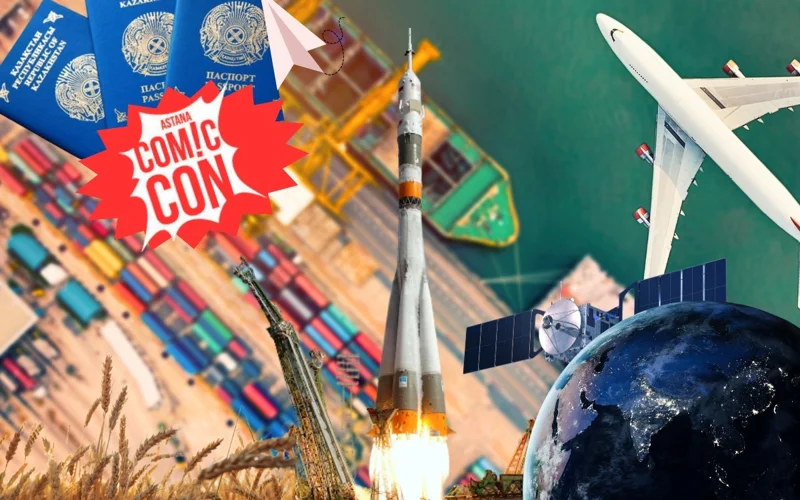Foreign media on Kazakhstan: Kazakhstan plans to use Baltic ports to increase grain shipments to EU; Kazakhstan and China to build ground satellite station in Almaty
Based on recent developments, including plans to use Baltic ports to boost grain exports to the EU, efforts to commercialize Soyuz rocket launches from the Baikonur Cosmodrome by 2028, and the hosting of Central Asia’s largest Comic Con featuring home-grown talent, Kazinform News Agency presents a weekly review of Kazakhstan’s coverage in foreign media.

APK INFORM: Kazakhstan plans to use Baltic ports to increase grain shipments to the EU
The EU remains one of Kazakhstan’s key partners in the agro-industrial sector, with bilateral agricultural trade reaching $1.3 billion in 2024 - a 7% increase. In the first five months of 2025, trade rose by another 11%, totaling $662.2 million, according to Agriculture Minister Aidarbek Saparov, reports APK INFORM.
“We have significant potential to increase exports of environmentally friendly products, particularly grain and flour, and are ready to ensure stable grain supplies to the European market. In this regard, negotiations are underway with Estonia and Latvia to use Baltic ports as transit hubs,” he stated.
Kazakhstan sharply increased wheat exports to the EU in the 2024/25 season, with Italy purchasing 354,000 tons and Latvia 42,000 tons. Other buyers included Belgium, Portugal, the Netherlands, Poland, and Denmark.
Saparov also noted ongoing European investment activity, including three major projects worth over $270 million. “We are open to proposals for expanding the presence of European companies and deepening cooperation with the EU,” he added.
The Times of Central Asia: Kazakhstan leads Central Asia in latest global passport rankings
Kazakhstan holds the most powerful passport in Central Asia, according to the latest update of the Henley Passport Index, The Times of Central Asia reports. The index ranks 199 passports by the number of destinations their holders can access without a prior visa. Kazakh citizens can now travel to 79 countries visa-free.
Following Kazakhstan in the regional ranking is Kyrgyzstan, whose passport ranks 73rd globally with access to 63 countries. Uzbekistan is close behind in 74th place, with 62 visa-free destinations. Tajikistan ranks 80th (56 countries), while Turkmenistan trails at 85th, with just 49 destinations accessible without a visa.
The Henley Passport Index calculates scores by awarding one point for each destination where no visa is required, or where travelers can obtain a visa on arrival, a visitor’s permit, or an electronic travel authorization. A score of zero is assigned if a visa is required prior to departure or if government pre-approval is needed for a visa on arrival.
On the global stage, Singapore retains the top spot for the second consecutive year, granting its passport holders visa-free access to 193 countries. Japan and South Korea share second place, each offering visa-free travel to 190 destinations. The top ten is dominated by European countries.
Travel Tomorrow: Kazakhstan eyes space tourism market as Baikonur Cosmodrome turns 70
According to Travel Tomorrow, Kazakhstan’s Baikonur Cosmodrome, established in 1955, is the world’s first and longest-operating spaceport. Though leased to Russia until 2050 and still used for over 20 launches annually - including all Russian missions to the International Space Station - Kazakhstan is preparing for a new chapter as it reclaims decommissioned facilities, including Gagarin’s historic launchpad.
“In the future, the Kazakh side can turn it into a tourist site - a place where visitors can come, explore, and connect with the history of the very launchpad from which the first human journeyed into space, from Kazakh soil,” said Kairat Nurtay, the Special Representative of the President at the Baikonur Complex.
A consortium between Kazakh Tourism and state-owned Infracos has already been formed to develop space tourism infrastructure. As of September, the transformation plan is expected to be approved, paving the way for hotels, glamping sites, and immersive attractions.
“At the moment, we are developing four areas of ground-based space tourism,” noted Leila Bakytova of Kazakh Tourism, highlighting educational, cultural, event-driven, and adventure tours. A museum already exists on-site, and tourists have begun viewing rocket launches from a specially built yurt near the 31st launch pad.
By 2029, Kazakhstan hopes to welcome up to 50,000 visitors a year. “It would be amazing if people could witness a rocket launch with their own eyes… even simulate the experience of launching a rocket from the control centre,” said museum expert Rinat Kutdussov.
Looking ahead, Kazakhstan aims to commercialize Soyuz rocket launches by 2028, with test flights beginning as early as the end of 2025, according to Aerospace Committee Chairman Baubek Oralmagambetov.
The Times of Central Asia: Kazakhstan and China to build ground satellite station in Almaty
According to The Times of Central Asia, Kazakhstan and China have agreed to build a $3 million ground satellite station in Almaty to boost regional satellite data infrastructure and scientific collaboration. The station will be located at Al-Farabi Kazakh National University and developed in partnership with China’s Hainan Satellite Data and Application Research Center and Northwestern Polytechnical University. It will operate in the X-band frequency, enabling the reception of data from both Kazakh and foreign satellites.
“This initiative builds on last year’s cooperation agreement between Al-Farabi Kazakh National University and China’s Northwestern Polytechnical University to conduct joint research using a microsatellite,” said Margulan Ibraimov, Vice-Rector for Research and Innovation. “Our researchers are currently working together on the NKSAT project, a next-generation microsatellite that will be the first of its kind in the region.”
The station’s construction follows a visit by a delegation from China’s Hainan Province and is part of growing high-tech cooperation between the two countries. It reflects Kazakhstan’s broader strategy to strengthen domestic space capabilities and become a regional hub for satellite-based services.
Euronews: Crazy for comics: Home to Central Asia’s biggest Comic Con, Kazakhstan nurtures home-grown talent
In a video episode of Modern Nomads by Euronews, the report explores Kazakhstan’s emerging comics scene - following a local artist now working with Marvel and showcasing the largest Comic Con in Central Asia.
As the country’s comic scene blossoms, Kazakh comic artists are drawing inspiration from national symbols and iconic imagery - and even introducing Kazakh-inspired characters into the Marvel universe.
The video report describes breakout talents, comic bookstore owners, and local authorities supporting this growing industry.
The main event for fans is Comic Con Astana, a five-day festival that’s growing every year - this year it welcomed a record 75,000 visitors, including 10,000 from abroad.
“With Hollywood stars, influencers, and a cosplay contest with a prize fund nearing €25,000, the festival is putting Kazakhstan’s comic scene on the map”, the report concludes.
You can read last week’s weekly digest here.
